Leave all doubts: how to avoid the impostor syndrome
I recently participated in Feral Vector , an independent gaming festival held in Hebden Bridge, United Kingdom. This is an amazing event, and if you have never been there, I recommend to visit it. This year I wanted to take part, so I made a short speech about the impostor syndrome, in which I talked about psychological problems and creativity. It was an honor for me to climb this stage and give this speech in front of the whole hall.

After the talk, I received many good comments from great people. It seems that they mostly liked the slides I created, but the very content of the speech found a response from very few. I thought it would be nice to record my speech and make a quality article. I didn’t use notes or scripts, so I tried to roughly match what I was saying, and added some additional information.

My name is Stuart Lilford. I think I can call myself a game designer. For three years I worked in studios in the QA / Design departments, and then I started creating games on my own and giving lectures at a college in Yorkshire. My latest game was The Temple of ADVENTURE , created for Adventure Jam, and now I'm working on Splodey Vaders for Android and iOS.
But enough about me. Let's find out a little about you. I want to start this article by asking you a question: “Did you have an imaginary friend as a child?” Think and raise your hand if you have been. I asked the audience for the Feral Vector audience and many hands went up in the air, that is, many people had imaginary friends as children.
')
I, too, * had an * imaginary friend, but he appeared in my life when I got a little older (about 14 years old), and he is still with me. However, he was less of an imaginary friend, and more of an imaginary asshole. His name is Jason.

Jason is an asshole, because he is one of those people who constantly humiliate you. When I decide to try to create something creative, Jason appears only to ask me: why bother at all? When I post something online, whether it's a game or some kind of graphics, Jason is right there to say that I shouldn't have done this and I look like an idiot. When I am praised or acknowledged my merits for what I have created, it will definitely be there to say that all this is a hoax and I do not deserve recognition. I'm not as good as others doing the same job. Those who praise me make a mistake.
Jason appears constantly, but there were often cases when he really negatively influenced my mental state. Here are some of the most important examples of how Jason appeared in my life:

This is me when I was just going to work as a game designer for the first time. I was supposed to work in an independent game-making studio, published by Sony. I was in incredible delight. Since childhood, when I first played in Super Mario All Stars, I wanted to become a game designer. I was well aware how difficult it is to get a designer’s job without experience, because I read many articles about it. I thought I was very lucky with the position offer. I studied this subject at the university and now I will get a real job! This was my dream and I was eager to start.
But then Jason appeared.

“What are you doing? You have no experience in the design of games and now you want to earn it? You had a mediocre university. He was controlled by a graphic designer who did not even play games. You will fail. You will never get this job. ”
Despite Jason's whispers, I stayed at work for about a year, but the contract was temporary, for three months, and the studio extended it every three months. One month I was told that the contract would not be renewed and I no longer worked in the gaming industry. I found this a confirmation of Jason's words and told myself that he was right, although it is obvious that this was a business decision. I thought that this position was not for me, I was not good enough, I was not worthy of the gaming industry.
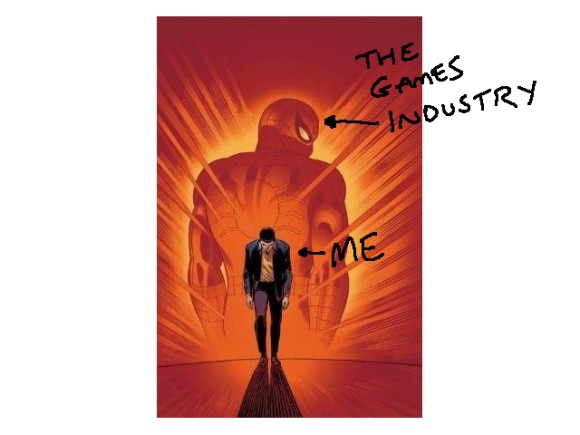
I and the game industry
I decided not to look for a job in the industry anymore and stopped making games for a while. I turned away from the video games and got a job working in the amazing world of B2B sales. I sold non-ferrous metals to wholesalers of stainless steel and aluminum to businesses and companies. Sales were not my passion and I hated my job. Soon the desire to create returned to me and I began to make games again.
I created a short point-and-click adventure Time Stone in Adventure Game Studio. Desperately trying to quit sales, I used this game as an example of my skills when I was working as a game design teacher for 16-18 year old students at a local college. At first it was only an hourly labor contract, but after six months I was accepted as the lead teacher of game design.

I really liked my post. It was a full-time, full-time job, and I enjoyed teaching design to students. This post gave me stability, which was not enough when working in the gaming industry, besides, I worked with a favorite topic (as opposed to sales, which I hated). But I had no experience in teaching, and Jason was not slow to appear again.

“Did you get the position of a leading teacher who is responsible for the whole course?” You taught less than half a year, and now you will control people who have more experience than you! Your bosses seriously wrong. "
When I got this job, I felt like a fraud, but I stayed on it and have been working for three years now. I love my work and I think that my contribution should be proud. I'm glad I got this job, but it took me a long time to feel that I was worthy of her.

Recently I was considering the opportunity to participate in the Feral Vector. I have already been to this event and wanted to participate not only as a spectator. It was interesting for me to give a talk or, for example, to help in conducting a master class.
I sent a letter to the event organizer, proposing several ideas for reports and simply sought to actively participate. But as soon as I sent the letter, Jason looked at me through the monitor and began to whisper through the speakers.

“I can not believe you sent a letter. Why should they even want * you * to perform? No one even knows who you are. There will be much more experienced people performing when you come up on stage, everyone will think: “What kind of a dummy is this?” And leave. You will not withstand the tension and they will soon realize that you have no idea what you are talking about. ”
I panicked and could not fall asleep for a long time until I read Danny Moore’s article “ Life with an Impostor Syndrome ”. He is a screenwriter of games; in the article he describes his experiences of the impostor syndrome. The article touched me very much. I began to read more and more about this topic, constantly nodding, agreeing and thinking: “yes, this is about me!”
So what is the "impostor syndrome"? In essence, this feeling, you are a crook and you are not a successful, competent or intelligent person; you just pretend to them, despite all the evidence to the contrary. You are constantly worried that you will be "baked", everyone will understand that you are not smart, not talented and not stubborn. The gaming industry consists of many clever, talented, hardworking, creative people, so we can naturally assume that many in it have such feelings. Despite the lack of comprehensive information about the imposter syndrome, the symptoms often recur. Here are some of the most common:
Periods of Avoiding Creative Work
If you feel like an impostor, then you think you should not bother, and this leads to long periods of avoidance of creative work. In the case of Danny, a colleague in a review of his script asked if he had dyslexia. This deprived him of confidence and for some time he could not engage in writing. As for me, when my contract was not extended, I took it as a confirmation of my feeling as an impostor and did not work for several months.
Desire not to stand out
When the opportunity arises: applying for a job, sending a game to an event or demonstrating your creations to someone, the impostor’s syndrome inspires the feeling that the result of labor should not be shared, the game is not good enough, and you are not good enough. These feelings naturally lead to the fact that you try not to stand out and not risk it.
Stress and anxiety
The syndrome can cause great anxiety, because you convince yourself that at any moment you are “calculated”, and in the long run it can lead to depression.
Low evaluation of their experience
In the very first lines of this article, I said: "I think I can call myself a game designer." I used the words and phrases “think”, and “I can call”, which gives me an impostor, even if I am not him. Sufferers of the impostor syndrome have difficulty accepting that any praise they receive is sincere, they underestimate all their personal achievements.
Linking your success with luck
Another symptom is that you associate most of your success with pure luck, and not with hard work. I hated most of the time spent in sales, but once the manager said the phrase that struck me. She is a successful woman, with a status job and a good salary. Her brother often envied her, her beautiful home and expensive car, and said at the same time “you are so lucky.” She replied: "It's funny, but it seems that the more I work, the more I get lucky." I always remembered this phrase when I tried to connect any success with luck.
Feeling nervous from meeting obviously successful people in your field of activity.
After the release of Thimbleweed Park, I saw how many people posted a screenshot of it. It depicts a game character, game designer, who is very afraid to talk at the exhibition with an obviously successful game designer.

People usually posted this picture with a comment about how similar it is to them. Many of them, it seems, were themselves creators and compared their own success with perceived success. At the same time, they felt like cheaters with regard to their talents. I think this is enough for anyone to decide that you should not talk to a “more successful” person, because he is wasting his time.
What can you do about it
There are various ways in which you can fight imposter syndrome. I shortened the list to the top five.
1. Be kind to each other.
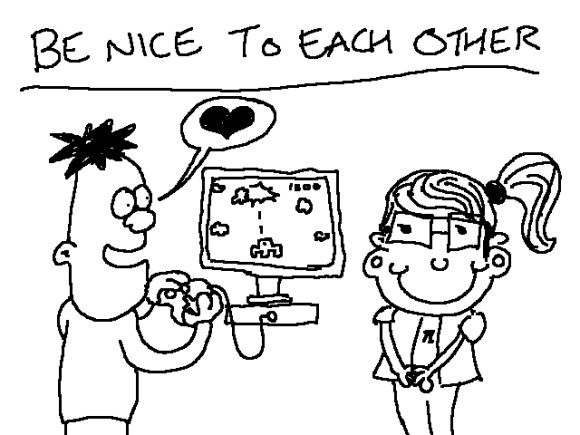
The impostor syndrome occurs when your invisible asshole tells you that your work is bad, so one way of fighting is for a lot of people to tell you that your work is * good *. If we like someone's work, then we should get in the habit of talking about it. I understand that sometimes in communication it is inconvenient to tell someone that you like their work, but even something simple like likes, retweets or positive comments under the animated GIF of the gameplay allows you to hear less voices of different jason.
2. Recognize your achievements (maybe even keep a list)

Link your success with your own hard work, and instead of the negative aspects of the project, look at the positive.
Take a recent example from my life - The Temple of Adventure, which I made for Adventure Jam 2017. This is a game I made in two weeks with the help of my artistic friends to learn how to work with the Unreal Engine 4. The game is full of bugs, imperfect and not completed. She did not make it to the top 12 nominated games, and in some comments, people claimed that she looked like another, already existing game.
But if you look at the positives and focus on the achievements of the game - PC Gamer announced it as one of the best free games of the week, I got to the list of 25 best games of jam (number 24, but I'm still on the list!), She was watched by several flyers, and two of them had more than ten thousand views, in the final voting of the jam she took 19th place (out of 122 games), but became the seventh rated gamejolt among the games with the AdvJam2017 tag and got the third place in the category “Dialogues”. If we consider that I worked on the game for only two weeks, during my free time and other duties, plus using the engine, with which I had almost no experience, then everything is not so bad. On the contrary, even pretty good.
You need to evaluate your achievements in this way, perhaps even keep a list. Everything I mentioned could be written into my personal “list of achievements” to which I could refer. Every time you feel like a cheat, you can refer to this list and it will help you to continue working on what you love and share it with the rest.
3. Take advantage of opportunities
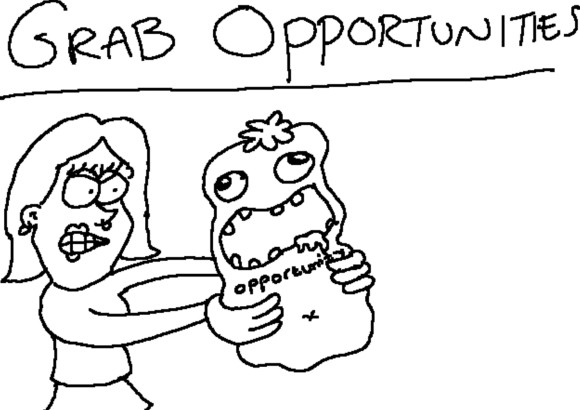
The impostor syndrome can make you think that when you are given the opportunity, you should not spend any effort on it. I am not experienced enough to try to get a job, my project is not good enough to participate in a competition / exhibition, etc. Everyone has an uncertainty in their abilities, but if you let this uncertainty grow and take control over the choice of decisions, then everyone will lose out of it. If you do not try to get a job, you will potentially lose an excellent job, and the employer will potentially lose an excellent hardworking and creative employee. The worst that can happen is that which does not happen. If you do not take advantage of emerging opportunities, then you might steal a great game from the world or an excellent team member.
4. Stop comparing yourself to others.
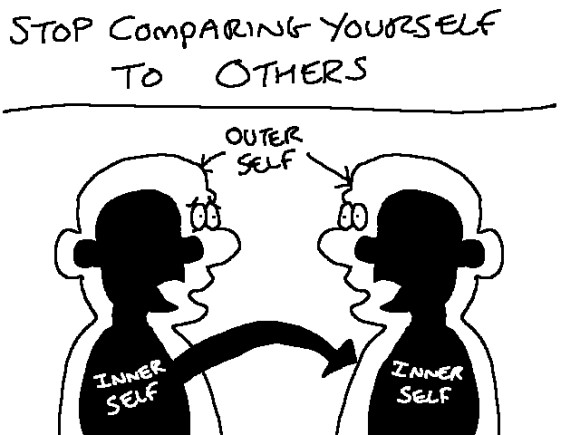
When you are in the same room with a 20-year veteran of the industry, who is crowned with awards and is simply a wonderful person, then you will most likely feel like a cheat on his background, but this does not mean that you are not capable of anything. This is where the above-mentioned list comes in handy: if you have compiled it, then you already have real proof that you are something valuable.
If you compare yourself with the leaders and veterans in your field of work, you will feel that you are not good enough, but these are incomparable values. Most likely, you will compare your inner self with the outer self of others. You compare your insecurity, your doubts, your sense of an impostor with the success, confidence and experience of another person. In the end, you do not know how this person feels inside. Success can exacerbate the impostor syndrome, and the people around them may seem to themselves even more scammers than you. Compare only what is comparable, and stop comparing your inner feelings with the external manifestations of other people.
5. Talk about your problems.
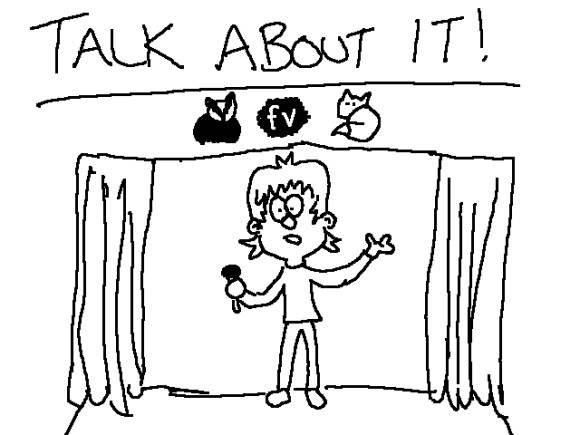
I am very grateful to Danny for writing an article about the impostor syndrome. She really helped me at that moment when I was filled with self-doubt. At this moment of the speech, I asked people in the audience who of them had feelings similar to the symptoms of the impostor syndrome described by me, and most of the listeners raised their hands. Some studies say that 70% of people have such feelings. That is why I wanted to talk about it, so I wanted to write this article. We need to share more of our feelings so that people with such thoughts can become aware of them and subject them to study. Are you really a deceiver, or have you worked hard to achieve everything you have? Find people you can say, "I feel like a cheat." Do they really agree with you?

Danny's article helped me in this; she made me think and question everything Jason whispered to me. I looked at Jason and said, "Wait a minute." I saw him in a different light and decided that I had enough. I took off Jason's hat and glasses, took off his raincoat, and under them I found an abomination ...

Jason was just a disgusting slug monster who pretended to be my own thoughts. All this time he has been camouflaged.
So, when you have thoughts that you are unworthy of something, or all your successes are just luck, ask yourself if this is true or if you are experiencing impostor syndrome. Remember who these real impostors are Jason and all imaginary assholes like him.
Thanks for reading the article!
I apologize to anyone called Jason.

After the talk, I received many good comments from great people. It seems that they mostly liked the slides I created, but the very content of the speech found a response from very few. I thought it would be nice to record my speech and make a quality article. I didn’t use notes or scripts, so I tried to roughly match what I was saying, and added some additional information.

My name is Stuart Lilford. I think I can call myself a game designer. For three years I worked in studios in the QA / Design departments, and then I started creating games on my own and giving lectures at a college in Yorkshire. My latest game was The Temple of ADVENTURE , created for Adventure Jam, and now I'm working on Splodey Vaders for Android and iOS.
But enough about me. Let's find out a little about you. I want to start this article by asking you a question: “Did you have an imaginary friend as a child?” Think and raise your hand if you have been. I asked the audience for the Feral Vector audience and many hands went up in the air, that is, many people had imaginary friends as children.
')
I, too, * had an * imaginary friend, but he appeared in my life when I got a little older (about 14 years old), and he is still with me. However, he was less of an imaginary friend, and more of an imaginary asshole. His name is Jason.

Jason is an asshole, because he is one of those people who constantly humiliate you. When I decide to try to create something creative, Jason appears only to ask me: why bother at all? When I post something online, whether it's a game or some kind of graphics, Jason is right there to say that I shouldn't have done this and I look like an idiot. When I am praised or acknowledged my merits for what I have created, it will definitely be there to say that all this is a hoax and I do not deserve recognition. I'm not as good as others doing the same job. Those who praise me make a mistake.
Jason appears constantly, but there were often cases when he really negatively influenced my mental state. Here are some of the most important examples of how Jason appeared in my life:

This is me when I was just going to work as a game designer for the first time. I was supposed to work in an independent game-making studio, published by Sony. I was in incredible delight. Since childhood, when I first played in Super Mario All Stars, I wanted to become a game designer. I was well aware how difficult it is to get a designer’s job without experience, because I read many articles about it. I thought I was very lucky with the position offer. I studied this subject at the university and now I will get a real job! This was my dream and I was eager to start.
But then Jason appeared.

“What are you doing? You have no experience in the design of games and now you want to earn it? You had a mediocre university. He was controlled by a graphic designer who did not even play games. You will fail. You will never get this job. ”
Despite Jason's whispers, I stayed at work for about a year, but the contract was temporary, for three months, and the studio extended it every three months. One month I was told that the contract would not be renewed and I no longer worked in the gaming industry. I found this a confirmation of Jason's words and told myself that he was right, although it is obvious that this was a business decision. I thought that this position was not for me, I was not good enough, I was not worthy of the gaming industry.

I and the game industry
I decided not to look for a job in the industry anymore and stopped making games for a while. I turned away from the video games and got a job working in the amazing world of B2B sales. I sold non-ferrous metals to wholesalers of stainless steel and aluminum to businesses and companies. Sales were not my passion and I hated my job. Soon the desire to create returned to me and I began to make games again.
I created a short point-and-click adventure Time Stone in Adventure Game Studio. Desperately trying to quit sales, I used this game as an example of my skills when I was working as a game design teacher for 16-18 year old students at a local college. At first it was only an hourly labor contract, but after six months I was accepted as the lead teacher of game design.

I really liked my post. It was a full-time, full-time job, and I enjoyed teaching design to students. This post gave me stability, which was not enough when working in the gaming industry, besides, I worked with a favorite topic (as opposed to sales, which I hated). But I had no experience in teaching, and Jason was not slow to appear again.

“Did you get the position of a leading teacher who is responsible for the whole course?” You taught less than half a year, and now you will control people who have more experience than you! Your bosses seriously wrong. "
When I got this job, I felt like a fraud, but I stayed on it and have been working for three years now. I love my work and I think that my contribution should be proud. I'm glad I got this job, but it took me a long time to feel that I was worthy of her.

Recently I was considering the opportunity to participate in the Feral Vector. I have already been to this event and wanted to participate not only as a spectator. It was interesting for me to give a talk or, for example, to help in conducting a master class.
I sent a letter to the event organizer, proposing several ideas for reports and simply sought to actively participate. But as soon as I sent the letter, Jason looked at me through the monitor and began to whisper through the speakers.

“I can not believe you sent a letter. Why should they even want * you * to perform? No one even knows who you are. There will be much more experienced people performing when you come up on stage, everyone will think: “What kind of a dummy is this?” And leave. You will not withstand the tension and they will soon realize that you have no idea what you are talking about. ”
I panicked and could not fall asleep for a long time until I read Danny Moore’s article “ Life with an Impostor Syndrome ”. He is a screenwriter of games; in the article he describes his experiences of the impostor syndrome. The article touched me very much. I began to read more and more about this topic, constantly nodding, agreeing and thinking: “yes, this is about me!”
So what is the "impostor syndrome"? In essence, this feeling, you are a crook and you are not a successful, competent or intelligent person; you just pretend to them, despite all the evidence to the contrary. You are constantly worried that you will be "baked", everyone will understand that you are not smart, not talented and not stubborn. The gaming industry consists of many clever, talented, hardworking, creative people, so we can naturally assume that many in it have such feelings. Despite the lack of comprehensive information about the imposter syndrome, the symptoms often recur. Here are some of the most common:
Periods of Avoiding Creative Work
If you feel like an impostor, then you think you should not bother, and this leads to long periods of avoidance of creative work. In the case of Danny, a colleague in a review of his script asked if he had dyslexia. This deprived him of confidence and for some time he could not engage in writing. As for me, when my contract was not extended, I took it as a confirmation of my feeling as an impostor and did not work for several months.
Desire not to stand out
When the opportunity arises: applying for a job, sending a game to an event or demonstrating your creations to someone, the impostor’s syndrome inspires the feeling that the result of labor should not be shared, the game is not good enough, and you are not good enough. These feelings naturally lead to the fact that you try not to stand out and not risk it.
Stress and anxiety
The syndrome can cause great anxiety, because you convince yourself that at any moment you are “calculated”, and in the long run it can lead to depression.
Low evaluation of their experience
In the very first lines of this article, I said: "I think I can call myself a game designer." I used the words and phrases “think”, and “I can call”, which gives me an impostor, even if I am not him. Sufferers of the impostor syndrome have difficulty accepting that any praise they receive is sincere, they underestimate all their personal achievements.
Linking your success with luck
Another symptom is that you associate most of your success with pure luck, and not with hard work. I hated most of the time spent in sales, but once the manager said the phrase that struck me. She is a successful woman, with a status job and a good salary. Her brother often envied her, her beautiful home and expensive car, and said at the same time “you are so lucky.” She replied: "It's funny, but it seems that the more I work, the more I get lucky." I always remembered this phrase when I tried to connect any success with luck.
Feeling nervous from meeting obviously successful people in your field of activity.
After the release of Thimbleweed Park, I saw how many people posted a screenshot of it. It depicts a game character, game designer, who is very afraid to talk at the exhibition with an obviously successful game designer.

People usually posted this picture with a comment about how similar it is to them. Many of them, it seems, were themselves creators and compared their own success with perceived success. At the same time, they felt like cheaters with regard to their talents. I think this is enough for anyone to decide that you should not talk to a “more successful” person, because he is wasting his time.
5 tips on fighting imposter syndrome
What can you do about it
There are various ways in which you can fight imposter syndrome. I shortened the list to the top five.
1. Be kind to each other.

The impostor syndrome occurs when your invisible asshole tells you that your work is bad, so one way of fighting is for a lot of people to tell you that your work is * good *. If we like someone's work, then we should get in the habit of talking about it. I understand that sometimes in communication it is inconvenient to tell someone that you like their work, but even something simple like likes, retweets or positive comments under the animated GIF of the gameplay allows you to hear less voices of different jason.
2. Recognize your achievements (maybe even keep a list)

Link your success with your own hard work, and instead of the negative aspects of the project, look at the positive.
Take a recent example from my life - The Temple of Adventure, which I made for Adventure Jam 2017. This is a game I made in two weeks with the help of my artistic friends to learn how to work with the Unreal Engine 4. The game is full of bugs, imperfect and not completed. She did not make it to the top 12 nominated games, and in some comments, people claimed that she looked like another, already existing game.
But if you look at the positives and focus on the achievements of the game - PC Gamer announced it as one of the best free games of the week, I got to the list of 25 best games of jam (number 24, but I'm still on the list!), She was watched by several flyers, and two of them had more than ten thousand views, in the final voting of the jam she took 19th place (out of 122 games), but became the seventh rated gamejolt among the games with the AdvJam2017 tag and got the third place in the category “Dialogues”. If we consider that I worked on the game for only two weeks, during my free time and other duties, plus using the engine, with which I had almost no experience, then everything is not so bad. On the contrary, even pretty good.
You need to evaluate your achievements in this way, perhaps even keep a list. Everything I mentioned could be written into my personal “list of achievements” to which I could refer. Every time you feel like a cheat, you can refer to this list and it will help you to continue working on what you love and share it with the rest.
3. Take advantage of opportunities

The impostor syndrome can make you think that when you are given the opportunity, you should not spend any effort on it. I am not experienced enough to try to get a job, my project is not good enough to participate in a competition / exhibition, etc. Everyone has an uncertainty in their abilities, but if you let this uncertainty grow and take control over the choice of decisions, then everyone will lose out of it. If you do not try to get a job, you will potentially lose an excellent job, and the employer will potentially lose an excellent hardworking and creative employee. The worst that can happen is that which does not happen. If you do not take advantage of emerging opportunities, then you might steal a great game from the world or an excellent team member.
4. Stop comparing yourself to others.

When you are in the same room with a 20-year veteran of the industry, who is crowned with awards and is simply a wonderful person, then you will most likely feel like a cheat on his background, but this does not mean that you are not capable of anything. This is where the above-mentioned list comes in handy: if you have compiled it, then you already have real proof that you are something valuable.
If you compare yourself with the leaders and veterans in your field of work, you will feel that you are not good enough, but these are incomparable values. Most likely, you will compare your inner self with the outer self of others. You compare your insecurity, your doubts, your sense of an impostor with the success, confidence and experience of another person. In the end, you do not know how this person feels inside. Success can exacerbate the impostor syndrome, and the people around them may seem to themselves even more scammers than you. Compare only what is comparable, and stop comparing your inner feelings with the external manifestations of other people.
5. Talk about your problems.

I am very grateful to Danny for writing an article about the impostor syndrome. She really helped me at that moment when I was filled with self-doubt. At this moment of the speech, I asked people in the audience who of them had feelings similar to the symptoms of the impostor syndrome described by me, and most of the listeners raised their hands. Some studies say that 70% of people have such feelings. That is why I wanted to talk about it, so I wanted to write this article. We need to share more of our feelings so that people with such thoughts can become aware of them and subject them to study. Are you really a deceiver, or have you worked hard to achieve everything you have? Find people you can say, "I feel like a cheat." Do they really agree with you?

Danny's article helped me in this; she made me think and question everything Jason whispered to me. I looked at Jason and said, "Wait a minute." I saw him in a different light and decided that I had enough. I took off Jason's hat and glasses, took off his raincoat, and under them I found an abomination ...

Jason was just a disgusting slug monster who pretended to be my own thoughts. All this time he has been camouflaged.
So, when you have thoughts that you are unworthy of something, or all your successes are just luck, ask yourself if this is true or if you are experiencing impostor syndrome. Remember who these real impostors are Jason and all imaginary assholes like him.
Thanks for reading the article!
I apologize to anyone called Jason.
Additional reading
http://www.wygamer.com/blog/living-with-imposter-syndrome
https://thehustle.co/why-70-percent-of-millennials-have-impostor-syndrome
http://impostersyndrome.com.au/
https://www.bustle.com/articles/119129-12-signs-you-might-be-suffering-from-imposter-syndrome-fellow-perfectionists-im-looking-at-you
https://startupbros.com/21-ways-overcome-impostor-syndrome/
https://thehustle.co/why-70-percent-of-millennials-have-impostor-syndrome
http://impostersyndrome.com.au/
https://www.bustle.com/articles/119129-12-signs-you-might-be-suffering-from-imposter-syndrome-fellow-perfectionists-im-looking-at-you
https://startupbros.com/21-ways-overcome-impostor-syndrome/
Source: https://habr.com/ru/post/347646/
All Articles